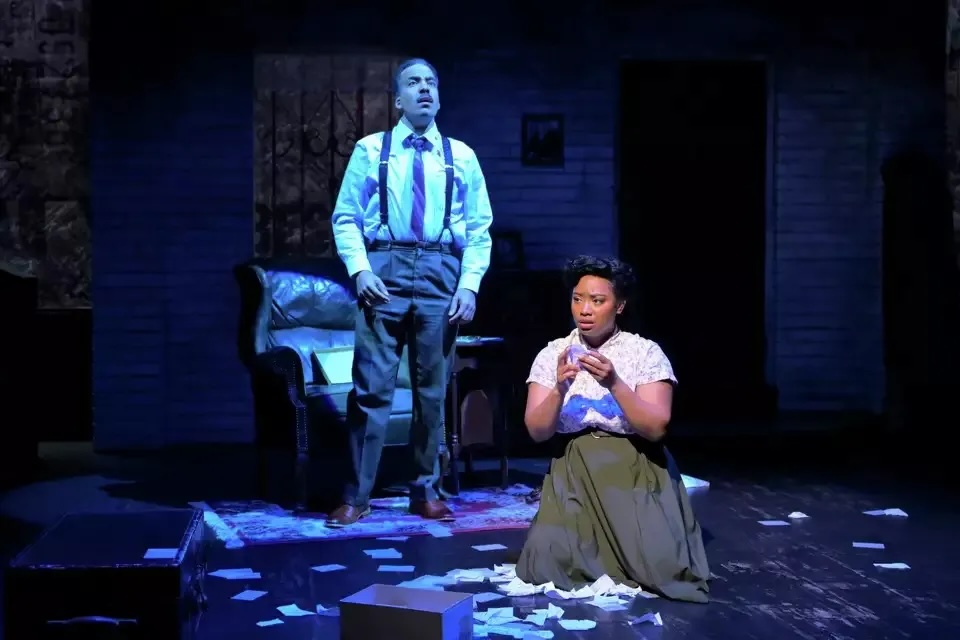For those who have seen later works by lauded playwright Lynn Nottage—such as her devastating Pulitzer Prize-winner “Ruin” about the plight of women during the civil war in Congo—an early one from 1995 might seem surprisingly mild: a family drama with humor set in 1950.
But “Crumbs from the Table of Joy,” now in a beautifully etched production at Aurora Theatre Company in Berkeley, is devastating in its own, subtle way, albeit with a hopeful ending.
The Crump family—father Godfrey and two teenage daughters—recently has moved from sunny Florida to this mostly white “brick and concrete” Brooklyn neighborhood. As a Black family, they’re (rightfully) at risk there.
Godfrey (played by David Everett Moore with deep-seated rage and shame) is grieving for the recent death of his wife. He has turned to religion, specifically to Father Divine whom he has never met but who, he is sure, will answer all his despairing questions about life. (As the theater’s digital program explains, Father Divine was a Black preacher who led a civil rights movement in the mid-20th century.) The despairing Godfrey refers to himself as “a poor colored man from Pensacola.”
In a way that’s like Tennessee Williams’ Tom in “The Glass Menagerie,” quiet older daughter Ernestine (Anna Marie Sharpe) stands slightly apart, narrating this quasi-memory play while also appearing within it. At 17 and about to graduate from high school, she, like Tom, has hopes and dreams.
Younger sister Ermina (Jamella Cross) is the feisty one. Both women inhabit their characters with full and touching commitment. Their at times antagonistic sisterly relationship rings true.
Early in Act 1, Aunt Lily (a terrific Asia Nicole Jackson, impassioned and impudent, seductive) sashays in. She’s a vision in a bright red suit, high heels, hat and gloves. (The period-perfect costumes are by Becky Bodurtha.) A committed communist and feminist/anti-racist activist, she disrupts the family dynamic in more ways than one might expect. Her political convictions are especially a threat to everyone around her.

By the end of Act 1, a white, German woman, Gerte (the always wonderful Carrie Paff), enters the scene and creates further disruption, but no spoilers here.
In this elegantly balanced drama, Nottage gives every character equal weight.
Solitary, serious Ernestine, preparing for graduation, occasionally imagines charming little scenes before admitting that, well, it didn’t happen that way. It’s a clever theatrical device.
Godfrey scribbles down desperate questions to ask Father Divine and intermittently bursts into helpless tears.
Aunt Lily gets drunk a lot and reveals layers of hurt and rage.
And Gerte, as the wild card in the mix, is entirely unpredictable.
Director Elizabeth Carter handily moves the players around Aurora’s open and intimate playing area and creates just the right balance of humor and fury throughout. And Randy Wong-Westbrooke’s simple set—not much more than an upstage brick wall, a giant console radio, a round table, a chair that Aunt Lily flings herself into dramatically, cigarette in hand—is perfect, as is sound designer Ray Archie’s between-scenes bebop score.
Nottage’s play, in the hands of this excellent team, is likely to get under your skin—no matter your race or ethnicity—in the special way that only live theater has the superpower to do.
“Crumbs from the Table of Joy” runs through May 25 at Aurora Theatre Company, 2081 Addison St., Berkeley. Tickets are $38-$68 at auroratheatre.org.
The post Review: Aurora Theatre’s ‘Crumbs from the Table of Joy’ a beautifully drawn portrait of a family in the 1950s appeared first on Local News Matters.
